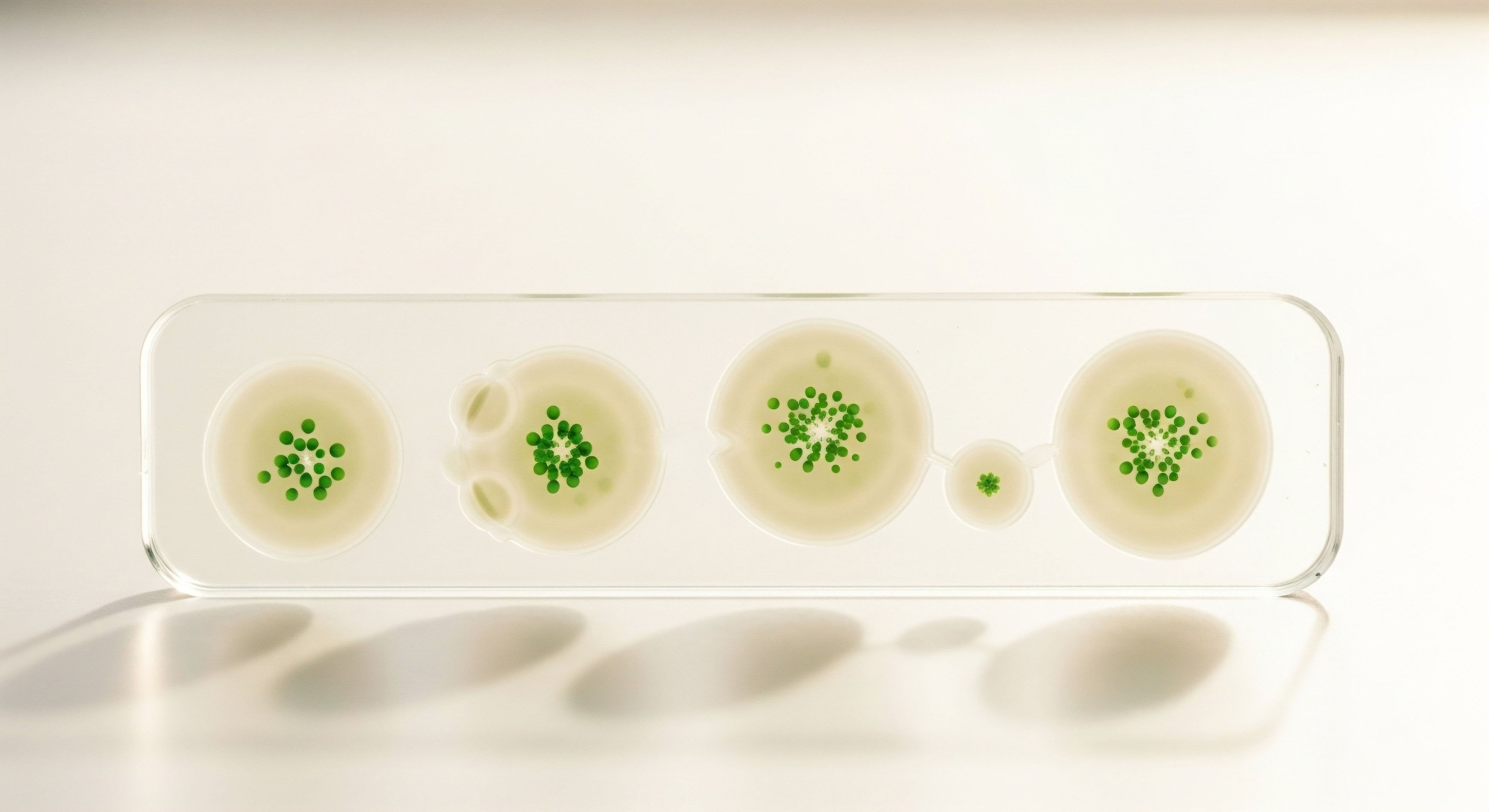

Fundamentals
Have you ever felt a subtle shift in your well-being, a persistent feeling of being slightly off, perhaps a lingering fatigue or an unexpected change in mood that defies easy explanation?
Many individuals experience these subtle yet unsettling symptoms, often attributing them to stress, aging, or simply “how things are.” Yet, beneath the surface of these daily experiences lies a complex, interconnected biological system, constantly working to maintain equilibrium.
Understanding your own internal landscape, particularly the intricate dance of your hormones and the unseen world within your gut, represents a powerful step toward reclaiming vitality and function. This journey of self-discovery begins with recognizing that your body communicates through a sophisticated network of chemical messengers and microbial inhabitants.
The body’s internal messaging system, the endocrine system, produces and circulates hormones, which are chemical signals regulating nearly every physiological process. These include metabolism, growth, mood, and reproductive function. Steroid hormones, a specific class of these messengers, are derived from cholesterol and encompass vital compounds such as testosterone, estrogen, progesterone, and cortisol.
Their precise balance is paramount for optimal health. When this balance is disrupted, the effects can ripple throughout the entire system, manifesting as the very symptoms many individuals experience.
Understanding your body’s chemical messengers and microbial inhabitants offers a powerful path to reclaiming vitality.

The Gut Microbiome a Hidden Regulator
Within your digestive tract resides a vast and diverse community of microorganisms, collectively known as the gut microbiome. This microbial ecosystem, comprising trillions of bacteria, fungi, and viruses, is far from a passive inhabitant. It actively participates in numerous bodily functions, influencing nutrient absorption, immune system modulation, and even neurotransmitter production.
Emerging scientific understanding reveals its profound impact on metabolic health and, increasingly, on hormonal regulation. The gut acts as a crucial interface between your external environment and internal biological processes.
The connection between the gut and hormones is not merely theoretical; it is a well-established biological pathway. Certain gut bacteria produce enzymes, such as beta-glucuronidase, which play a significant role in the metabolism and excretion of steroid hormones, particularly estrogens.
After hormones are processed by the liver, they are typically conjugated (attached to other molecules) to make them water-soluble for elimination from the body. Beta-glucuronidase can deconjugate these hormones, allowing them to be reabsorbed into circulation rather than excreted. This reabsorption can influence the overall circulating levels of hormones, potentially contributing to imbalances.

Hormone Recycling within the Body
Consider the process of hormone recycling within the body. When steroid hormones complete their tasks, the liver prepares them for removal. This involves attaching a glucuronide molecule, making the hormone ready for excretion via bile or urine.
However, if the gut microbiome contains a high activity of beta-glucuronidase, this enzyme can cleave off the glucuronide, freeing the hormone to be reabsorbed into the bloodstream. This mechanism directly impacts the body’s hormonal load and clearance, affecting the overall endocrine environment. A balanced gut microbiome helps ensure proper hormone elimination, preventing excessive reabsorption and maintaining physiological equilibrium.
This intricate interplay highlights a fundamental principle ∞ no biological system operates in isolation. The health of your gut directly influences the delicate balance of your hormones, underscoring the potential for targeted interventions to support overall well-being. Recognizing this connection is the first step toward a more integrated and effective approach to hormonal health.


Intermediate
Moving beyond the foundational understanding of gut-hormone interactions, we can now explore how targeted probiotic supplementation might influence steroid hormone levels and integrate with established clinical protocols for hormonal optimization. Many individuals seeking to restore their vitality often consider interventions like testosterone replacement therapy or growth hormone peptide therapy. The efficacy and safety of these protocols are well-documented, yet their success can be influenced by underlying systemic factors, including the state of the gut microbiome.
Targeted probiotic supplementation involves introducing specific strains of beneficial bacteria into the digestive system with the aim of modulating the gut environment. The premise is that by optimizing the microbial balance, one can indirectly influence various physiological processes, including hormone metabolism. While direct, dramatic shifts in steroid hormone levels from probiotics alone are generally not observed, their influence on the pathways that regulate hormone activity is a compelling area of investigation.

Can Probiotics Influence Hormone Metabolism?
The primary mechanism through which probiotics are thought to influence steroid hormones involves their impact on the estrobolome, a collection of gut bacteria capable of metabolizing estrogens. An imbalanced estrobolome, characterized by an overabundance of beta-glucuronidase-producing bacteria, can lead to increased deconjugation of estrogens in the gut.
This process allows estrogens, which were destined for excretion, to be reabsorbed into the bloodstream. Elevated or imbalanced estrogen levels, even in men, can contribute to symptoms such as fatigue, mood disturbances, and changes in body composition. By introducing probiotic strains that may reduce beta-glucuronidase activity or promote beneficial metabolic pathways, the body’s ability to excrete excess estrogens could be enhanced, contributing to a more balanced hormonal profile.
Probiotics may influence hormone metabolism by modulating the estrobolome, impacting estrogen reabsorption.
Consider the common clinical protocols for hormonal optimization. For men experiencing symptoms of low testosterone, Testosterone Replacement Therapy (TRT) often involves weekly intramuscular injections of Testosterone Cypionate. This protocol frequently includes Gonadorelin to maintain natural testosterone production and fertility, and Anastrozole to manage estrogen conversion.
For women, TRT protocols might involve lower doses of Testosterone Cypionate via subcutaneous injection, often alongside Progesterone, particularly during peri-menopause or post-menopause. Pellet therapy offers a long-acting alternative. The effectiveness of these therapies relies on the body’s ability to metabolize and utilize these hormones efficiently. A healthy gut microbiome could support optimal hormone processing and reduce potential side effects related to estrogen imbalances.

Probiotic Support for Hormonal Protocols
While probiotics are not a substitute for prescribed hormonal therapies, they can serve as a complementary strategy. Their role is to optimize the internal environment, potentially enhancing the body’s response to hormonal interventions and supporting overall metabolic health.
The interaction between gut health and hormonal balance extends beyond estrogen. The gut microbiome also influences the production of short-chain fatty acids (SCFAs) like butyrate, which are vital for gut barrier integrity and systemic inflammation control.
Chronic inflammation can disrupt the delicate feedback loops of the endocrine system, affecting cortisol production and potentially impacting the hypothalamic-pituitary-gonadal (HPG) axis, which governs sex hormone production. By supporting gut integrity and reducing inflammation, targeted probiotics could indirectly contribute to a more stable hormonal milieu.
Here is a comparison of how different hormonal protocols might be supported by a healthy gut environment:
| Hormonal Protocol | Primary Goal | Potential Gut Microbiome Influence |
|---|---|---|
| Testosterone Replacement Therapy Men | Restore optimal testosterone levels, alleviate hypogonadal symptoms. | Supports healthy estrogen metabolism, reduces inflammation, potentially improves nutrient absorption for hormone synthesis cofactors. |
| Testosterone Replacement Therapy Women | Balance sex hormones, address symptoms of hormonal shifts (e.g. low libido, mood changes). | Aids in balanced estrogen excretion, supports overall endocrine signaling, may reduce inflammatory impact on ovarian function. |
| Growth Hormone Peptide Therapy | Anti-aging, muscle gain, fat loss, sleep improvement. | Improves gut barrier function, reduces systemic inflammation, which can optimize cellular response to growth factors and peptides. |
| Post-TRT or Fertility-Stimulating Protocol | Restore endogenous hormone production, support fertility. | Supports HPG axis function by reducing inflammatory stressors, aids in metabolic clearance of therapeutic agents. |
Probiotic supplementation, when considered within a comprehensive wellness strategy, aims to create a more receptive and efficient internal environment for the body’s natural hormonal processes and any exogenous hormonal support. This approach recognizes the interconnectedness of systems, moving toward a more integrated understanding of well-being.


Academic
The scientific exploration into the direct effects of targeted probiotic supplementation on steroid hormone levels necessitates a deep dive into molecular endocrinology and systems biology. While the concept of the gut-hormone axis is gaining recognition, the precise mechanisms and the extent of probiotic influence on steroidogenesis, transport, and metabolism remain areas of active research. This section will analyze the complexities of this interaction, drawing upon current scientific understanding and clinical investigations.
Steroid hormones, including androgens, estrogens, progestogens, glucocorticoids, and mineralocorticoids, are synthesized from cholesterol through a series of enzymatic reactions primarily in the adrenal glands, gonads, and placenta. Their activity is tightly regulated by complex feedback loops involving the hypothalamus, pituitary gland, and target endocrine organs ∞ collectively known as the hypothalamic-pituitary-adrenal (HPA) axis and the hypothalamic-pituitary-gonadal (HPG) axis.
The gut microbiome exerts its influence not by directly synthesizing these hormones, but by modulating their enterohepatic circulation, bioavailability, and receptor sensitivity.

How Do Gut Microbes Alter Hormone Bioavailability?
The primary pathway for gut microbiome influence on steroid hormones involves their metabolism and excretion. After synthesis and action, steroid hormones are inactivated in the liver through conjugation, primarily with glucuronic acid or sulfate, making them water-soluble for excretion. This conjugated form is then secreted into the bile and enters the intestine.
Here, certain gut bacteria possess enzymes, notably beta-glucuronidase, which can deconjugate these hormones. This enzymatic activity releases the active, unconjugated hormone, allowing it to be reabsorbed into the systemic circulation. A dysbiotic gut, characterized by an altered microbial composition and increased beta-glucuronidase activity, can lead to an elevated reabsorption rate of hormones, particularly estrogens, thereby increasing their circulating levels and potentially altering the overall hormonal balance.
Gut microbes influence steroid hormones by modulating their enterohepatic circulation and bioavailability.
Beyond deconjugation, the gut microbiome also influences the availability of precursors for hormone synthesis and the overall metabolic environment. For instance, gut bacteria produce short-chain fatty acids (SCFAs) like butyrate, propionate, and acetate through the fermentation of dietary fibers.
These SCFAs are not only vital energy sources for colonocytes but also possess systemic effects, including anti-inflammatory properties and modulation of glucose and lipid metabolism. Chronic low-grade inflammation, often linked to gut dysbiosis and a compromised gut barrier, can disrupt the HPA axis, leading to altered cortisol rhythms and downstream effects on sex hormone production. By promoting SCFA production and reducing inflammation, targeted probiotics could indirectly support a more stable endocrine environment.

Specific Probiotic Strains and Their Effects
Research has begun to identify specific probiotic strains with potential roles in hormone modulation. For example, certain strains of Lactobacillus and Bifidobacterium have been investigated for their ability to reduce beta-glucuronidase activity in vitro and in animal models.
A reduction in this enzymatic activity could theoretically lead to decreased reabsorption of conjugated estrogens, promoting their excretion and potentially lowering circulating estrogen levels. This mechanism holds particular relevance for conditions where estrogen dominance is a concern, such as certain aspects of peri-menopause or in men with elevated estrogen.
The complexity extends to the direct impact on androgen metabolism. While less studied than estrogen, there is emerging evidence suggesting that gut microbiota can influence androgen levels, possibly through similar deconjugation mechanisms or by affecting the synthesis of androgen precursors. The gut-brain axis, mediated by microbial metabolites and neurotransmitters, also plays a role in regulating the HPG axis, adding another layer of complexity to the interaction.
Here is a summary of potential mechanisms by which gut microbiota can influence steroid hormone levels:
- Deconjugation Enzymes ∞ Bacteria producing beta-glucuronidase can deconjugate hormones, allowing reabsorption.
- Short-Chain Fatty Acids ∞ SCFAs influence inflammation and metabolic health, indirectly affecting endocrine axes.
- Gut Barrier Integrity ∞ A healthy gut barrier reduces systemic inflammation, supporting hormonal balance.
- Precursor Availability ∞ Microbiota may influence the availability of cholesterol or other precursors for steroidogenesis.
- Neurotransmitter Modulation ∞ Gut-derived neurotransmitters and metabolites can influence the HPG and HPA axes.
Despite promising preclinical data, robust human clinical trials demonstrating direct, significant, and consistent alterations in systemic steroid hormone levels solely due to probiotic supplementation are still relatively limited. Many studies focus on indirect markers or specific conditions like polycystic ovary syndrome (PCOS) or menopausal symptoms, where hormonal imbalances are a key feature. The challenge lies in the vast diversity of the human microbiome, the variability in probiotic strains, and the multifactorial nature of hormonal regulation.
A deeper understanding of the specific microbial consortia and their enzymatic capabilities is needed to develop truly targeted probiotic interventions for hormonal health. The future of this field likely involves personalized microbiome analysis to identify specific dysbiotic patterns that contribute to hormonal imbalances, followed by precision probiotic or prebiotic interventions. This academic pursuit aims to refine our ability to support hormonal well-being through a holistic, systems-based approach.
| Hormone Class | Key Metabolic Pathways Influenced by Gut Microbiota | Potential Clinical Relevance |
|---|---|---|
| Estrogens | Enterohepatic circulation via beta-glucuronidase activity; conjugation/deconjugation balance. | Estrogen dominance symptoms, peri-menopausal shifts, prostate health in men. |
| Androgens | Less understood, but potential for deconjugation and precursor influence. | Testosterone bioavailability, androgen-related conditions. |
| Cortisol | Indirect influence via inflammation, HPA axis modulation, SCFA production. | Stress response, adrenal fatigue, metabolic syndrome. |
| Progestogens | Similar enterohepatic circulation mechanisms, though less direct evidence. | Progesterone balance, menstrual cycle regularity. |
The integration of microbiome science into endocrinology represents a frontier in personalized health. While the direct, isolated impact of probiotics on steroid hormone levels requires further elucidation through rigorous clinical trials, the mechanistic plausibility and the broader influence of gut health on systemic physiology provide a compelling rationale for considering the microbiome as a vital component of hormonal well-being.

References
- Baker, Jennifer M. et al. “Estrogen Metabolism and the Gut Microbiome.” Journal of Steroid Biochemistry and Molecular Biology, vol. 182, 2018, pp. 104-110.
- Clarke, Gerard, et al. “The Gut Microbiota and the HPA Axis ∞ Implications for Stress and Anxiety.” Neurogastroenterology & Motility, vol. 25, no. 5, 2013, pp. 367-373.
- Cryan, John F. and Timothy G. Dinan. The Psychobiotic Revolution ∞ Mood, Food, and the New Science of the Gut-Brain Connection. National Geographic Books, 2017.
- Dinan, Timothy G. and John F. Cryan. “The Microbiome-Gut-Brain Axis in Health and Disease.” Gastroenterology Clinics of North America, vol. 46, no. 1, 2017, pp. 1-14.
- He, Fei, et al. “The Role of Gut Microbiota in the Regulation of Sex Hormones in Women.” Frontiers in Cellular and Infection Microbiology, vol. 11, 2021, p. 748349.
- Neuman, Heather, et al. “The Gut Microbiome and Estrogen ∞ A Link to Endocrine-Related Diseases.” Current Opinion in Endocrine and Metabolic Research, vol. 15, 2020, pp. 10-15.
- Plottel, Chelsea S. and Martin J. Blaser. “Microbiome and Malignancy.” Cell Host & Microbe, vol. 10, no. 4, 2011, pp. 324-335.
- Ridlon, Jason M. et al. “Bile Acids and the Gut Microbiome.” Current Opinion in Gastroenterology, vol. 30, no. 3, 2014, pp. 332-338.
- Sarkar, Amar, et al. “Psychobiotics and the Microbiota-Gut-Brain Axis ∞ in the Pursuit of Novel Therapeutic Strategies for Psychiatric Disorders.” Translational Psychiatry, vol. 6, no. 11, 2016, e961.
- Valdes, Ana M. et al. “Role of the Gut Microbiota in Nutrition and Health.” BMJ, vol. 361, 2018, k2179.

Reflection
As you consider the intricate connections between your gut microbiome and hormonal health, pause to reflect on your own biological narrative. The knowledge presented here is not merely a collection of facts; it is a lens through which to view your personal experience with greater clarity.
Understanding these systems is the initial step, a powerful act of self-awareness. Your body possesses an innate capacity for balance, and by recognizing the subtle signals it sends, you can begin to make informed choices that support its natural intelligence. This ongoing dialogue with your internal systems represents a path toward reclaiming your full potential, a deeply personal journey toward sustained vitality and function.



